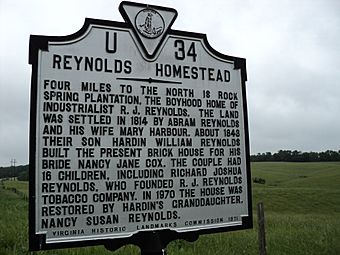Reynolds Homestead facts for kids
|
Reynolds Homestead
|
|

Historic marker for Reynolds Homestead
|
|
| Location | N of Critz on SR 798 |
|---|---|
| Area | 6.99 acres (2.83 ha) |
| Built | 1850 |
| Architect | Reynolds, Hardin W. |
| Architectural style | Greek Revival |
| NRHP reference No. | 71000987 |
Quick facts for kids Significant dates |
|
| Added to NRHP | September 22, 1971 |
| Designated NHL | December 22, 1977 |
The Reynolds Homestead is a special historical place in Critz, Virginia. It was once a large farm known as Rock Spring Plantation. This homestead was the main home of R. J. Reynolds (1850–1918). He was famous for starting the R. J. Reynolds Tobacco Company and was one of the first to widely sell cigarettes.
The farm was first started in 1814 by Abram Reynolds. For many years, people were forced to work there without pay. In 1863, 88 enslaved people at the plantation gained their freedom. Today, the Reynolds Homestead is recognized as a National Historic Landmark, a very important historical site. It is now run by Virginia Tech and serves as a cultural center for the area. You can even take tours of the house!
Contents
Exploring the Reynolds Homestead
The Reynolds Homestead is in a quiet, countryside part of eastern Patrick County, Virginia. It's about a mile north of a small town called Critz. The main house is a two-story brick building with a unique hip roof. An older, two-story section extends from it.
What You Can See at the Homestead
Around the main house, you'll find other old farm buildings. These include a large corn crib (where corn was stored), a brick kitchen, a milkhouse, and an icehouse. There's also a family cemetery for the Reynolds family near the house. Across a field, you can find a cemetery for the enslaved people who lived and worked there. The house has been carefully restored to look like it did in the 1800s. It even has many of the original furniture pieces from the family.
The Reynolds Family Story
The land for the homestead was first developed by Abram Reynolds. He built a log cabin close to where the main house stands today. His son, Hardin W. Reynolds, later built up the estate in the mid-1800s. This is where his son, R. J. Reynolds, was born and lived for the first 24 years of his life.
R. J. Reynolds became very successful by selling a type of tobacco called plug tobacco. He later became even more famous when he introduced the Camel cigarette brand. He was very good at marketing and advertising his products widely.
The Homestead Today
R. J. Reynolds moved away from the family homestead in 1874. The property stayed in the family for many years, but it started to show its age. In 1968, Nancy Susan Reynolds, who was R.J.'s only surviving child, bought back a large part of the original farm. She gave most of this land to Virginia Tech. She made sure the homestead itself was carefully restored.
Now, Virginia Tech manages the property. It includes a center for continuing education, which is part of their outreach department. The Reynolds Homestead hosts many educational and cultural events. You can visit the house for tours, either by yourself or with a group. It's a great place to learn about history!
 | Stephanie Wilson |
 | Charles Bolden |
 | Ronald McNair |
 | Frederick D. Gregory |



